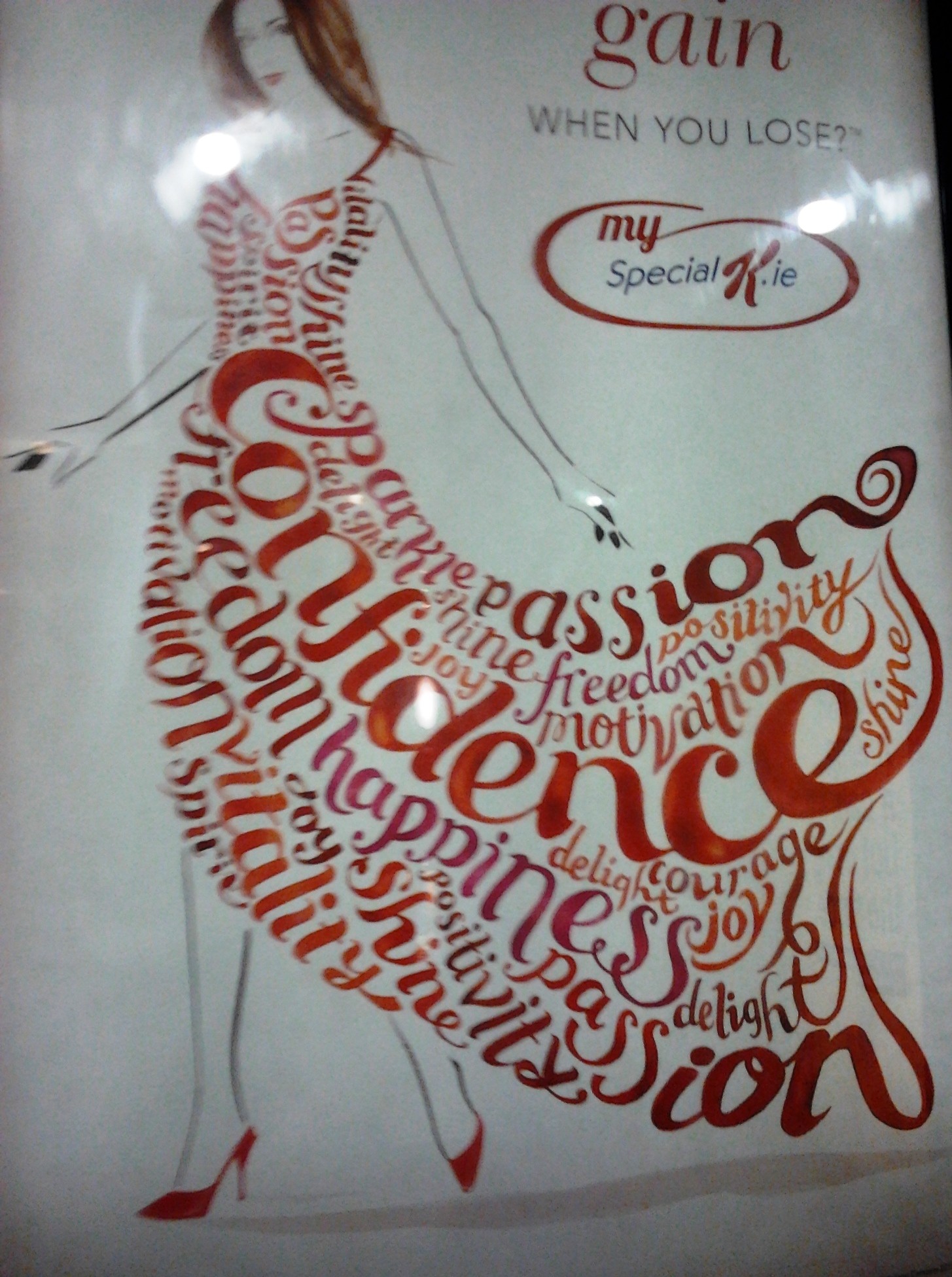Most people who have known me for a while, know that for a very long time I struggled with body image. I hope, at the very least, that I kept it to a dull roar because that kind of thing is tiring and toxic to be around.
It’s hard to remember when everything started because it started so early. Kids aren’t dumb; they spend a lot of time figuring out their environments, the social pecking order, and how to behave to get what they want. So even though my parents never put me on a diet, never put me down about my appearance, and never said that looking a certain way would bring positive or negative outcomes for me, I still put two and two together. From fairy tales to cartoons to toys to advertisements, I was taught that feminine beauty is linked to goodness and good outcomes. There’s also a pretty narrow definition of feminine beauty that I remember being shown: slender, white, blonde, unmarked skin, mostly hairless – a princess who is “fair.” I’m pretty sure I picked up on all of this before I could reliably count to 100.
Luckily, I’m in a much better place, but I was amazed when I made friends in their 50s and 60s who still put a lot of stock in how they looked for the same reasons I did in elementary school. These women aren’t stupid, weak, or vain. Unfortunately, there is some truth that the closer you look to the cultural ideal, the more likely it is that you will be visible and people will treat you better. I experienced this phenomenon with something as small as 10 lb weight loss. (No one let me forget how much better this version of myself was.)
However, I had hoped that middle age would be a magical time of not giving a shit about other people’s opinions. I hoped that it would be a world of matching pantsuits with shoulder pads, large costume jewelry, and getting away with being unabashedly frank.

It’s a scary thing, thinking that you will spend several more decades hating on yourself and being the person you least want to be around. But when I worked in an office that was majority women, this was the the expected and accepted mindset. The thing is beauty isn’t just about looking nice. Who better to illustrate this than the companies promising to sell weight loss and beauty?
(Note: I’m knocking ads, not the people who buy and enjoy these products. If you love these products, good for you! I’m glad you have food/services you really like.)
Let’s take a look at this Yoplait add:

Yoplait is calling weight loss a tune up. This means looking at your body as a thing to be fixed, like a car. They also promise “feeling better about yourself” in 2 weeks. Sure, they’re trying to sell yogurt, but the ad’s premise is about the creation of self-confidence in a short period of time. Presumably, through losing 5 lbs.
Next, let’s take a look at Special K. A sugary cereal whose selling point is almost entirely hinged on weight loss. It’s hard to choose one turd from all their bullshit ads, but this is probably the most telling:

First of all, apparently no matter what cereal you eat, if it’s the only thing you eat, you’ll probably lose weight (and you’re probably depressed.) Now looking at the paper doll Special K put words on, they don’t just say “fit smaller clothes,” but choose words that summon to mind a life that is more full and more complete that most people have. I’m not sure anyone is capable for feeling all those things, all day everyday. . . well, not legally, certainly not through eating cereal.
Finally, let’s take a look at Weight Watchers. I’ve had friends who have used and appreciated them, but their promise isn’t just weight loss:

Weight Watchers often use celebrity spokespersons to add some glamour to their ads. They’re also people that the target market likely looks up to as success stories even prior to weight loss. Also, consider the usage of the word “power.” Weight loss is not just about fitting in, it’s framed as self-control, not just in habits, but controlling your own destiny.
If you want an even more obvious example, consider this still shot from a Weight Watchers ad:
This is a frightening message to me because what we have is an empty plate with the word control on it. Now, that sounds like classic eating disorder mentality. I’m not a psychologist, but this is no longer about losing a couple pounds or fitting into a wedding dress, this is about the conflation of how you eat with how you are. That shit is dangerous on many, many levels.
Going back to my middle-aged friends and their body and diet concerns, there are some things that don’t go away as you get older. The desire to be in control, to be self-confident, to live your life to the fullest, to be desired and loved are going to remain. Often we’re told that changing how we look will help change how we are – in the fastest, most public way possible. I’ve personally gone through stressful transitions and felt an increased desire to look different, which would, of course, mean that I was doing well, that I was in control, and I could prove it to other people. The good news is that some of the positive stuff my parents did when I was growing up stuck, and beyond being in a negative funk, I haven’t hurt myself over this. Some people have.
I’ve come to a point where I finally feel pretty good about how I look. Unfortunately, no amount of compliments from friends and family help. If only it were that easy! If anything, focusing on my body as decorative or a fashion statement made things much, much worse, especially when people were complimenting me on weight loss and how much better I looked. I’m sure they were just being nice, but the message I took away was “Don’t fuck this up.” For those who want to know, here are some helpful steps I took to get to a better place:
- Fake it until you make it. Don’t talk about how much you hate your appearance. Eventually, you’ll think less about your appearance and spend less time validating your negative thoughts. This is actually really hard, especially when you think “fixing” how you look will make everything better. However, it was made easier when I thought about what awful behavior I would be modeling for some young people in my life. I’ve never had to shop in plus sized stores: calling myself “fat” was not only inaccurate, it was shitty for people trying to make me feel better and for people around me who actually were fat and received poor treatment due to their size.
- Avoid weight loss and beauty ads like the plague. (I recognize the irony that I included these ads in this post.) This is best done by watching Netflix, fast forwarding through all commercials if you DVR something, putting away magazines that make you feel crappy, and not going to websites/blogs that make you feel worse after visiting them. I see no downsides in doing this.
- Put your scale away. You won’t suddenly change shape just because you aren’t monitoring and judging yourself. This was a revelation: you don’t suddenly gain weight when you stop hating on yourself. (Of course, if you need to monitor weight for medical reasons, please keep doing it. I’m not your GP!)
- Do physical stuff that makes you happy: intramural sports, dance classes, walking a dog, eating well, making art, seeing how much weight you can lift, making music. Learn to appreciate your body for what it does not how it looks.
- Do yourself the favor of reading and exposing yourself to images and ideas that push back against the tide of looking a certain way as the only way. Some good places to start: https://danceswithfat.wordpress.com and http://www.lindabacon.org/haesbook/.
- Be kind to yourself when you look in the mirror and think, “OMG I’M A MONSTER! IF ONLY I WERE MORE/LESS JSK;AFA[EJAOIE!” You’re having a crappy day, and progress isn’t a steady x=y graph.
(Image at top from Twenty Pixels, who bravely rose to the occasion of meeting the needs of the internet: http://20px.com/blog/2013/02/09/the-curious-case-of-rainbow-pooping-unicorns/#.VhQJ7LRho20.)


I remember my first triathlon in 2013, we’re divided into groups by age/sex – and the announcer goes through and calls roll. When he announced Women 40+ – the radiance of that group! I’m still gunning that ‘middle age will be a magical time…’ having seen them.
😀 Hope continues on!
Any recommendations on reading material for partners? Many misters, I think, will not have a good idea of how to help and even less idea how they might be hindering.
The sad truth, is you literally cannot make someone feel better, and it is extremely hard to help someone with their own issues. The best thing to do is to be supportive and remember that your S.O. isn’t having issues at you.
To be supportive is pretty basic: Treat people well regardless of their looks and don’t use appearance-based insults for those you don’t like. Those around you will pick up on the fact that you value people/ideas/kindness and that you don’t use appearance as a measuring stick for human value. People, especially women, are told we need to maintain a certain appearance in order to be valued by friends, family, and society in general. If you can show that’s not true for you, that’s probably the best thing you can do. (Unless we’re talking about severe, health endangering stuff, then seek outside assistance.)
That being said there are some things confused folk can read if they can’t even grok where their S.O./friend/whoever is coming from.
For those who are ok with more academic reading, I can’t recommend “Unbearable Weight” by Susan Bordo enough.
While dated and occasionally flawed (esp. from the trans* perspective) Susan Brownmiller’s “Femininity” provides good insight into the pressure to conform and how something seemingly frivolous can have high stakes.
Dances with Fat has a good little break down about the fear of stigma: https://danceswithfat.wordpress.com/2011/09/23/fat-and-the-fear-of-it/
Shakesville’s Feminism 101 (http://www.shakesville.com/2010/01/feminism-101.html) has several helpful posts, but here are some specific ones about dealing with size/beauty expectations and the crap that comes with:
http://www.shakesville.com/2009/10/seven-scenes-for-reason.html
http://www.shakesville.com/2012/05/on-being-thin-friend-to-fatsronauts.html